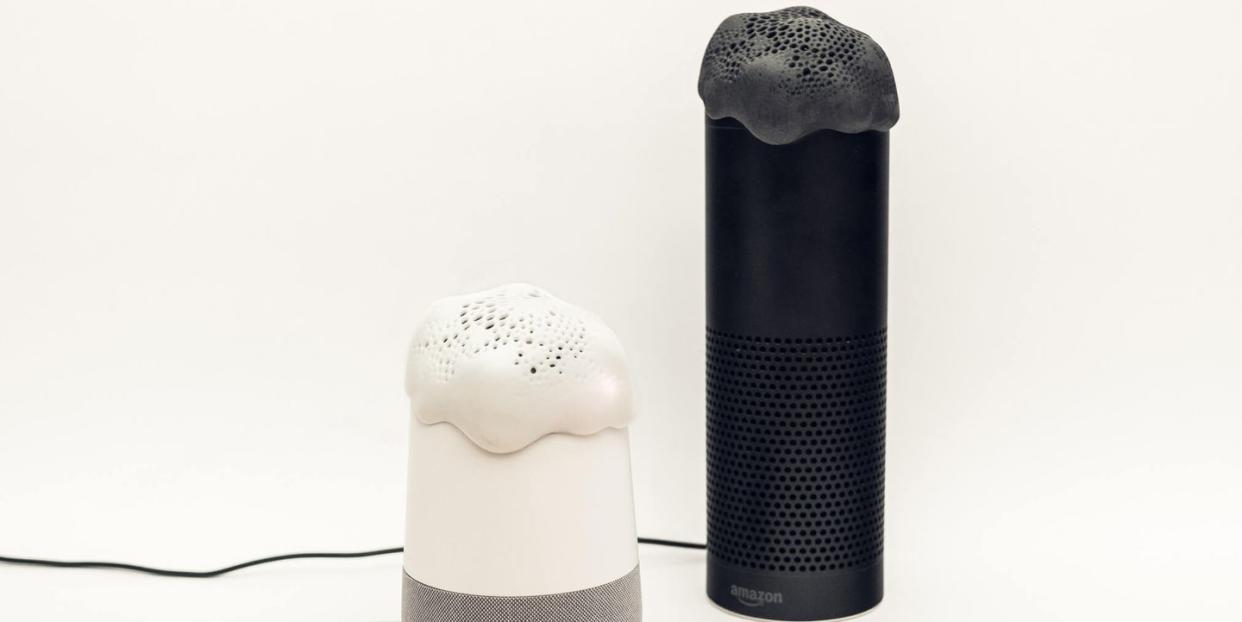Paranoid Your Amazon Echo Is Eavesdropping? There's A Way To Be Sure It's Not

Now that voice-controlled home assistants like Google Home and Amazon Echo have burrowed into millions of houses, the market has turned to accessories. This year at CES, dozens of companies announced Google Assistant- and Alexa-powered add-on gadgets, designed to extend your assistant's reach and smarten up your home one appliance at a time. But one of the most intriguing possible accessories actually takes the opposite approach; it puts your home assistant on a leash, and it's brilliant.
The gadget is called "Project Alias," and was developed by hacker/designers Bjørn Karmann and Tore Knudsen. "We [wanted to show] how DIY and open source can be used to create ‘viruses’ for big tech companies," Knudsen explained to Fast Company. Inspired by fungi that feed off a host, Project Alias is a small, open-source device that sits atop your voice assistant and whispers static into its ears. The "parasite" is in turn trained to respond to your wake word much the way the assistant beneath it is. When it hears the word, it passes along your command. The difference is that since the parasite is trained locally and through a process that's completely transparent, you can be sure that no one is eavesdropping without having to take anyone's word for it.
The add-on's somewhat adversarial relationship with its host gadget offers a feature you could never expect from an accessory built to play nice: It removes the need for you to trust Google or Amazon. That's terrific because both have shown they can't be trusted. Google Homes have been caught eavesdropping and Amazon Alexas have sent recordings to strangers, and while neither was a malicious invasion of privacy, that's a cold comfort if it happens to you. As a bonus, because the Project Alias device is already sitting between you and Google/Amazon, it can be programed to deliver a different command than the one it hears, allowing you to customize your own shortcuts in ways that the Home and Echo don't (yet) allow.
Traditionally, giant platforms like Google and Amazon and Facebook give outside developers access to what's called an Application Programming Interface or API, a small and controlled portion of the platform's inner workings that developers can use to build apps that plug into a service or work with an existing gadget. These APIs give developers the ability to connect to an infrastructure larger than they could ever hope to build, and allow platforms to maintain control over that relationship, up to and including starving off would-be competitors and other things that Facebook or Google or Amazon or whoever else find unsavory.
Since Project Alias does all of its funny business outside the assistant's sphere of influence and only interacts the same way a human would, it's functionally unstoppable. It's an approach already common on the web-from ad blockers to Firefox's "Facebook Container" extension-but shows promise for the real world as well.
Project Alias isn't a product you can buy. It's more a proof of concept. But since all of the code and instructions are open source, you could whip one up yourself if you'd like. This particular gadget is fascinating in practice, but is even more exciting in principle, implying there could someday be an entire ecosystem of "hostile" add-ons for all sorts of services.
Short of regulation to rein in mega-companies' many incentives to slurp up your data, we might need them.
Source: Fast Company, Project Alias
Follow House Beautiful on Instagram.
('You Might Also Like',)

